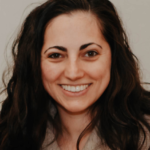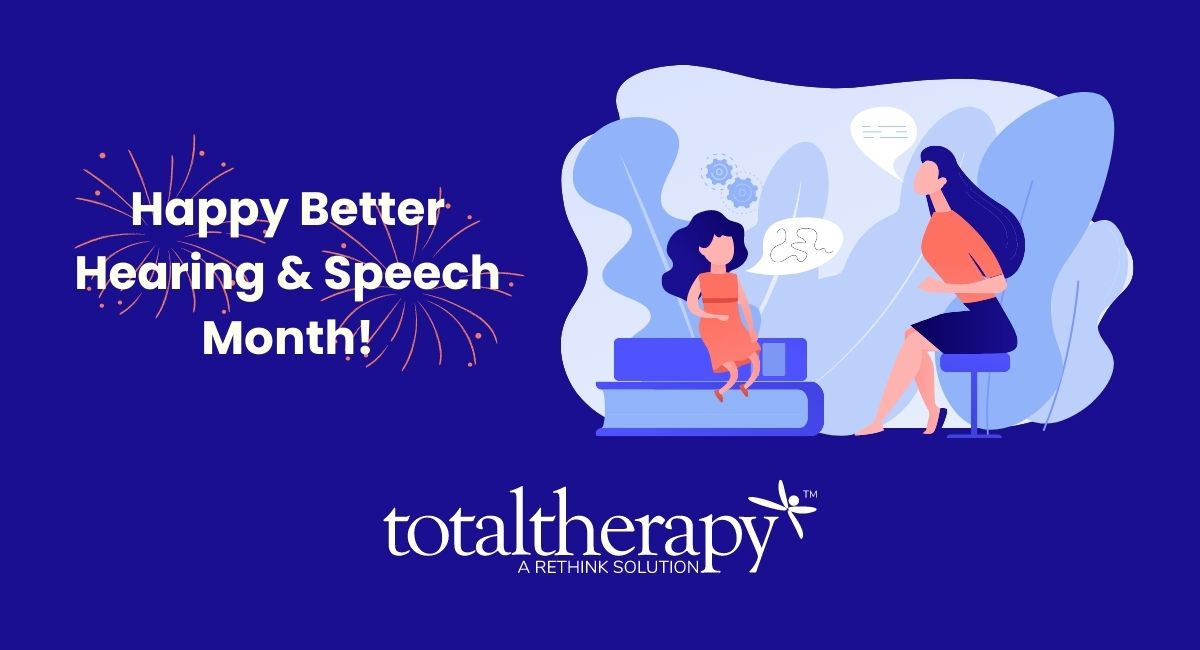May is national Better Hearing and Speech Month (BHSM), and TotalTherapy’s very own speech-language pathologist Olga Goncharov is using this year’s observance to raise awareness about what SLPs can do!
Give us a quick introduction: who you are and what do you do for TotalTherapy?
I’m a speech and language pathologist with 12 years of experience across the lifespan and continuum of care. So, I had the privilege of working with all age groups from neonates to geriatrics in hospitals, rehabs, NICUs, care facilities, and clinics. Working now at TotalTherapy I get to meet many passionate speech language pathologists who help their communities, every day. And I’m so grateful to be a part of that!
What does Better Hearing and Speech Month mean to you as a speech-language pathologist (SLP)?
This month is a time for us to raise awareness about speech, language, hearing, feeding, swallowing, voice, fluency, cognitive communication skills and disorders. Just to name a few 😉
The goal is to support individuals with various communication challenges, to help them connect with professionals such as SLPs who can provide much-needed services and improve their quality of life! That’s what Better Hearing and Speech Month is about.
Why do you enjoy being an SLP?
For all the reasons listed just now, I love my job, I love being an SLP! It goes without saying how rewarding helping others can be. Especially as I’ve seen the past few years during the pandemic, I was able to help many patients wean off the ventilators and start eating and speaking again. There are no words to describe that journey.
But SLPs cannot do this alone; while our scope of practice is vast, we work hard to build partnerships and collaborate with our clients, other professionals, researchers, and medical experts to provide evidence-based practice and serve our patients in the best capacity possible. There’s no greater reward than that.
Want to learn more about SLPs?
Here are 8 areas where speech-language pathologists can help their patients:
- Speech—People with speech problems may not say sounds clearly or smoothly. This may make it difficult for others to understand them.
- Language—A person with a language disorder may have problems with expressing themselves, understanding others, and reading and/or writing.
- Cognition—This can involve difficulties with attention, memory, problem-solving abilities, organizational skills, and judgment.
- Voice—Hoarseness, breathiness, pain, frequent coughing, and other problems with a person’s voice may result from medical problems or from overuse or misuse (certain professions—like teachers, musicians, and coaches—are at greater risk).
- Augmentative and Alternative Communication—People may need or choose to use other ways to communicate besides talking. These include no- or low-tech and high-tech options such as pointing or gesturing, using picture boards, and using speech-generating devices.
- Feeding and Swallowing—Difficulties may include coughing or gagging during meals, food or liquid leaking from the mouth, or food getting stuck in the mouth or throat. These difficulties may occur due to preterm birth, developmental disabilities, medical conditions, and illness and injury.
- Gender-Affirming Voice and Communication—This area may focus on pitch, tone, vocal health, nonverbal communication, and more.
- Communication Coaching—Some SLPs help with public speaking and communication style, which may include learning another accent.
 Olga Goncharov, M.A, CCC-SLPSpeech-Language Pathologist and Sales Consultant
Olga Goncharov, M.A, CCC-SLPSpeech-Language Pathologist and Sales Consultant
Olga is a Speech and Language Pathologist with over 12 years of experience in the field, specializing in swallow disorders, accent modification, and speech therapy services for adults working to improve overall personal and professional communication skills. Olga received her Bachelor’s degrees in Psychology and Linguistics from the University of Michigan in 2007 and her Masters in Communication Science and Disorders from Wayne State University in 2010.
She has since worked in several states and healthcare settings, currently residing in Northern VA and providing speech therapy services to clients via teletherapy and in acute care at three local hospitals.
